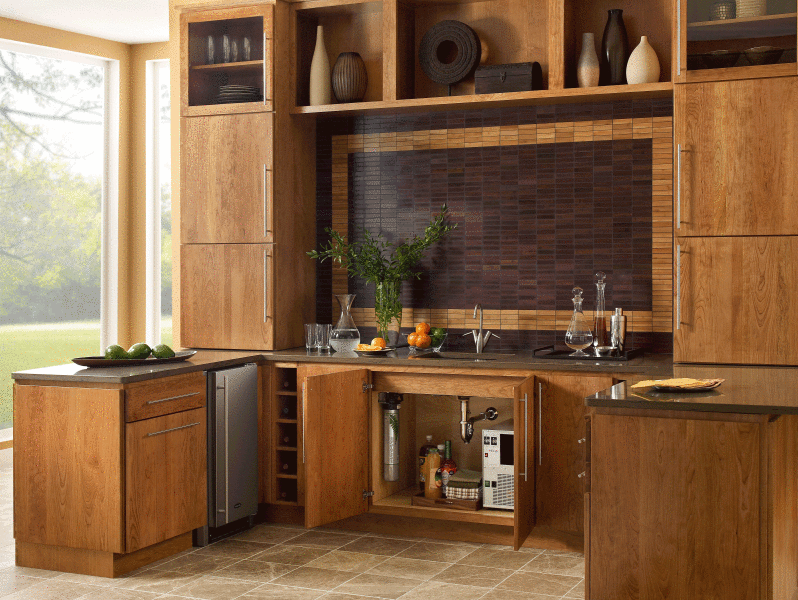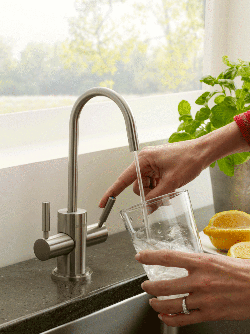
Here is a post from my assistant, Maureen, who is a strong advocate for green living. We'll be hearing from Maureen from time to time. Give her a little welcome too! Good work Maureen!
Thirty-Eight years after the inception of Earth Day, it has gone mainstream with events in countries all over the globe. Flooding the Blogosphere, networks and print media, Green has gone global, political and earned a former Vice President a Nobel Peace Price. It also made a strong presence at this year’s KBIS where Green was a hot theme as social consciousness entered the Kitchen Design world in a multitude of ways.
Intrinsically, we all want to lessen our environmental footprint – how does a mere mortal go about doing such (especially a SUV driving suburban mom)? Although not a terribly glam topic –we can begin our personal green campaigns in a very tangible and quantitative way. We can move away from the bottle!
An Inconvenient Truth
- Americans used 50 billions plastic water bottles last year – 40 billion of them ended up in landfills.
- To distribute the bottled water that’s hauled to and fro within the U.S. each week required the equivalent of 37,800 18 wheel trucks.
- Worldwide, 2.7 million tons of plastic are used each year to make water bottles, and in the United States, less than 20% of these are recycled.
- Americans throw away 22 billion water bottles each year, over 60 million a day.
- The 29 billion plastic bottles manufactured in the United States each year require the equivalent of more than 17 million barrels of crude oil.
- In 2006, American spent nearly $11 billion on over 8 billion gallons of bottled water.
Ouch! - from an environmental and financial standpoint. Plastic bottles are made from fossil fuels; fossil fuels are used to bottle the water, deliver the water to the stores, used to get consumers to the stores to buy the water and also used to get the garbage trucks to the homes to pick up the bottles. If the bottled are recycled, then you got it, more fossil fuels! Ok I am officially riddled with guilt about the countless bottles of water served to dinner guests, tucked into lunch boxes (OK bags that I didn't recycle) and taken to countless sporting events (yes in the SUV). In addition to the environmental impact, the cost is something to be considered in this teetering economy that’s gasping for air.
 Taking Back The Tap
Taking Back The Tap
Victoria Kaplan is the senior organizer with Food and Water Watch – a nonprofit that recent launched a Take Back the Tap campaign to get consumers to ditch bottled water. “The bottled water industry spends millions of dollars a year to convince us that their product is somehow safer or healthier than tap water, when in fact that is just not true,|” says Kaplan. Did you know that bottled water is subject to less-stringent government standards for quality than tap water? That’s not marketing hype, according to National Geographic Green Guide, as much as 40 percent of bottled water started out as the same tap water that we get at home. Americans are beginning to get the message that bottled water is expensive (more expensive per gallon than gasoline), not necessary safer than the H20 that flows from the tap water and burdened with incalculable environmental problems.
Everpure showcased at this year’s KBIS where they offered a powerful visual presentation of the environmental impact of bottled water. Although in the business of filtering water for restaurants for over 75 years, they now tout several products for the home. The H-300 Water Filtration System employs Everpure’s Micro-Pure® filtration removing impurities and providing what they say is the best tasting water available.
Although secondary to health issues, taste is critical when it comes to cooking and creating sauces, breads, pastries and making stocks and even cocktails. Home filtration units are a great step forward for both concerting cooks and envrionmentals alike. If you move away from the bottle, the results will be palpable.
The Everpure Exubera System dispenses chilled still or sparkling water right from the tap.
For more information about water and reusable bottles and canteens:

